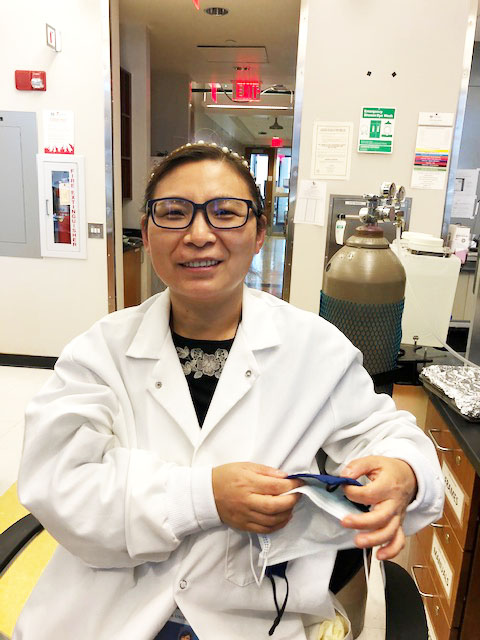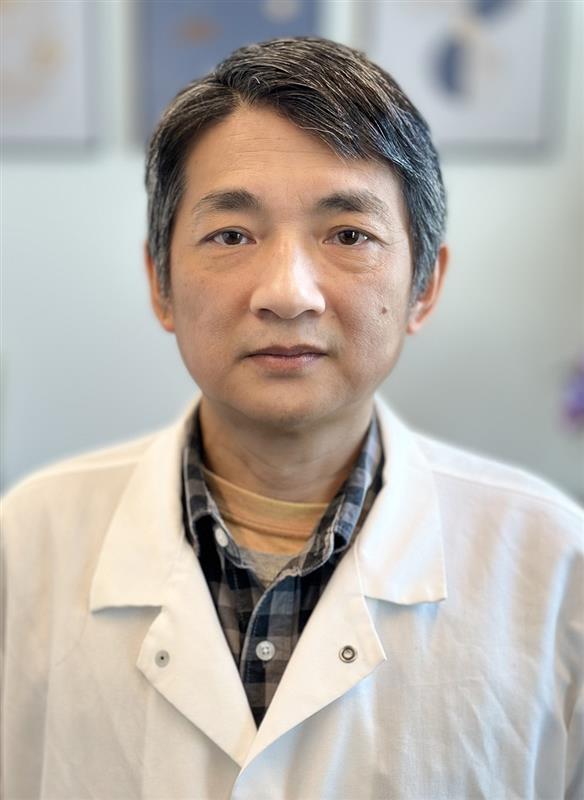
- Augusta University
- Georgia Cancer Center
- Research
- GCC Faculty Directory
- Moskophidis Lab
The Moskophidis Lab
Dimitrios Moskofidis, MD/PhD
(Demetrius Moskophidis)
Professor, Medicine
Professor, Biochemistry & Molecular Biology
Professor, Graduate Studies
Member, Molecular Oncology & Biomarkers Program
Chaperone Biology & Metabolism Research Group

Jump to: Research Summary Research Interests Selected Publications Research Team
Contact Us
The Dimitrios Moskophidis Lab
Health Sciences Campus
GCC - M. Bert Storey Research Building
1410 Laney-Walker Blvd., CN-3156D1
(706) 721-8738
Research Summary
The scope of our research includes studies on immune regulation, microbial (viral) pathogenesis and inflammation as well as studies on protein homeostasis and molecular chaperone biology/function. These are areas of great medical importance and there is reasonable expectation that this research will continue to provide the rationale to develop novel strategies to prevent, and perhaps more effectively treat, viral infectious diseases as well as patients with cancer and with age-related neurodegenerative diseases.
Research Interests
The primary focus of research in my laboratory, over the past two decades, has been to investigate microbial (viral) pathogenesis and immunology/inflammation, as well as mechanisms of protein homeostasis and molecular chaperone biology. The specific research areas can be summarized as follows:
Function of molecular chaperones and heat shock transcription factors in mouse models of human diseases (cancer)
This research area involves the study of cellular processes via which molecular chaperones and heat shock transcription factors (HSFs) mediate the host response to environmental stress and the role of these processes in human diseases such as cancer. Using genetically manipulated (knock-in and knock-out) mouse models and employing metabolic, proteomic and genomic methods we probe the basic mechanisms, by which the HSP70 and HSP90 chaperone machineries, in the endoplasmic reticulum (GRP78, GRP170, SIL1, GRP94), cytoplasm (HSP70, HSC70, HSP25), and mitochondria (GRP75), impact the progression of human metabolic diseases, cancer and neurodegeneration. Our work provided proof-of-concept information to demonstrate that the ability of the evolutionary conserved Heat Shock Transcription factors (HSFs) and particularly HSF1 to promote malignant cell transformation resides in its ability to stimulate transcription of mRNAs that encode proteins regulating adaptive energetic and metabolic pathways. Targeting inactivation of HSF1 interferes with the anabolic malignant state and is an effective strategy for prevention and therapy of several cancer types. Notably, this important research is the result of a long-term collaboration with Dr. N. Mivechi at the Georgia Cancer Center.
Deciphering the fundamental mechanisms coordinating the immune response to acute versus persistent viral infections and the implications in cancer immune evasion
Persistent viral infections create conditions for long-term pathologic consequences in human populations. A specific focus of my laboratory has been to elucidate the mechanisms by which viruses persist and escape immune surveillance. This research is important for our understanding of viral pathogenesis and for the development of measures to control and eliminate such infections and the diseases they cause. Our have provided proof-of-concept that:
- The evolution of the immune system has developed regulatory mechanisms to ensure efficient clearance of an infection with minimal damage to host tissues. Specifically, we discovered that during a rapidly spreading viral infection, the initially induced virus-specific CD8+ T cells fail to contain the infection as a result of progressive functional loss and physical elimination. This phenomenon, called “T cell exhaustion,” represents an important aspect in the regulation of protective immune responses. This observation has not only provided an avenue for studying interactions between viruses and the immune system in the context of acute or persistent infections, but also has stimulated innovative research on mechanisms facilitating malignant cell evasion from immune-mediated surveillance.
- Viruses persist in an immune population, as in the case of influenza, or in an individual, as postulated for HIV, when they are able to escape neutralizing antibodies by changing their antigens. This has been known since the original discovery in the 1980s that revealed that the evolution of influenza viruses is associated with the generation of antibody-resistant viral strains. We made the original discovery that viruses can escape surveillance by virus-specific T cells through introducing mutations in their genomes that alter the presentation of antigen-specific T cell epitopes. Since T cell-mediated immunity represents a critical defense mechanism of the host against microbial infections, this discovery has profoundly influenced our understanding about the evolution of microbial pathogens. Notably, antigenic variation, the rapid acquisition of latency in the infected host, and acute immune suppression, are features of many persistent viral infections.
Selected Publications
Jin X, Moskophidis D, Mivechi NF. (2023). Targeted Replacement of HSF1 Phosphorylation Sites at S303/S307 with Alanine Residues in Mice Increases Cell Proliferation and Drug Resistance. Methods Mol Biol. 2023;2693:81-94. PMID: 37540428.
Eroglu B, Jin X, Deane S, .ztürk B, Ross OA, Moskophidis D*, Mivechi N.F.*. (2022). Dusp26 phosphatase regulates mitochondrial respiration and oxidative stress and protects neuronal cell death. (*corresponding authors) Cell. Mol. Life Sci. 2022 Mar 21;79(4):198. PMID: 35313355.
Eroglu B, Pang J, Jin X, Xi C, Moskophidis D*, and Mivechi N.F.*. (2020). HSF1-mediated control of cellular energy metabolism and mTORC1 activation drive acute T cell lymphoblastic leukemia progression (*corresponding authors) Mol. Cancer Res. 18:463-476. PMID:31744878.
Cho W-H, Jin X, Pang J, Wang Y, Mivechi, N.F.*, and Moskophidis D*. (2019). The Molecular Chaperone HSP70 Controls Liver Cancer Initiation and Progression by Regulating Adaptive DNA-Damage and MAPK/ERK Signaling Pathways (*corresponding authors). Mol. Cell. Biol. 39: e00391-18.
Jin X, Qiao A, Moskophidis D*, Mivechi N.F*. (2018). Modulation of Heat Shock Factor 1 Activity through Silencing of Ser303/Ser307 Phosphorylation Supports a Metabolic Program Leading to Age-Related Obesity and Insulin Resistance. Mol. Cell. Biol. 38: e00095-18. (*corresponding authors).
Jin X, Eroglu B, Moskophidis D, Mivechi NF. (2018). Targeted Deletion of Hsf1, 2, and 4 Genes in Mice. Methods Mol Biol. 2018;1709:1-22. PMID: 29177647
Qiao, A., X. Jin, J. Pang, D. Moskophidis*, and Nahid F. Mivechi*. (2017). The transcriptional regulator of the chaperone response HSF1 controls hepatic bioenergetics and protein homeostasis. Journal Cell Biology 216: 723-741 (*corresponding authors).
Eroglu, B., M. Jin-Na, Y. Zhang, Szurek, E., D. Moskophidis, Ali Eroglu, and N.F. Mivechi. (2014). Genetic Interaction Between Heat Shock Transcription Factor Binding Protein 1 (HSBP1) and BRG1 Component of the Wnt Signaling Pathway During Early Embryonic Development. Dev. Biol. 386:448-460.
Current Research Support:
NIH 2 R01 CA132640, NIH 2 R01 CA062130, NIH 1 R01 AI55774.
Selected Publications


Peter Biggs
Reduce the Burden
The Georgia Cancer Center at Augusta University is dedicated to reducing the burden of cancer in Georgia and across the globe through superior care, innovation, and education. Through unprecedented expansion, the Georgia Cancer Center is providing access to more first-in-the-nation clinical trials, world-renowned experts and life-saving options.
Follow the Georgia Cancer Center